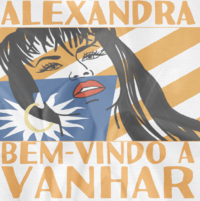Alexandra
This article is incomplete because it is pending further input from participants, or it is a work-in-progress by one author. Please comment on this article's talk page to share your input, comments and questions. Note: To contribute to this article, you may need to seek help from the author(s) of this page. |
Alexandra | |
|---|---|
 | |
| Born | Alexandra Arena Nunes Erlander August 5, 1972 |
| Died | June 11, 1996 (Aged 23) |
| Cause of death | Assassination |
| Occupation | Singer |
| Years active | 1982-1996 |
| Spouse(s) | Henrique Erlander (m. 1992) |
| Parents |
|
| Relatives | David Nunes (brother) Lorena Nunes (sister) |
| Awards | Full list |
Alexandra Arena Nunes Erlander (August 5 1972 - June 11 1996), popularly referred to as just Alexandra, also given the nickname the Gem of Vanhar (Jóia da Vánhar), was a Vanharian singer, fashion designer, and songwriter. She is known in the Asterias as the "Queen of Vanharian Music" her music made and expansion of both the Vanharian music and fashion industries made her one of the most famous Luzelese-language artists in the world. She began her with her family as part of Alexandra e O Esquadrão. Her career began to jump in 1988 and became popular in her home country before making it big in the Asterian Federative Republic, Euclea, and Rizealand, she would become known as the "Queen of Luzelese music". She would also create a fashion brand known as Alexandra. She was assassinated in 1996, having a lasting effect on fans, Vanhar, and the Luzelese speaking world.
Alexandra was born Alexandra Arena Nunes on August 5 1972 in Sacramonha, Naxi, to a lower class family. Her father and mother owned a restuarant in the city of De Castro and both were musicians, they would teach Alexandra to play the drums. Together her parents and siblings formed a baned known as Alexandra e O Esquadrão.
She began to grow her career and went solo in 1988 and would also join protests in Vanhar for independence from the AFR, which eventually collapsed in 1989. She would release numerous albums that became popular throughout the 1990s and became known as the Queen of Vanharian Music, she would become a symbol for the Vanharian people. She would perform across the globe in the AFR, Senria, and Euclea.
In 1996 she would be shot and killed by Clara Caballero, a supporter of the left-wing Estevist Army of National Liberation, who killed Alexandra in order to impress a high-ranking member of the organisation, Romeo Carazo Gron, who was appalled by Caballero's actions. Her killing would lead a lasting effect of the politics of Vanhar during the Vanharian Conflict, it saw the rise of the right-wing government of Pedro Riveiro. She has since developed a continuing fanbase, especially in the Luzelese-speaking world.
Early life
Born Alexandra Arena Nuneson August 5 1972 in the town of Sacramonha, Naxi to a lower class family alongside her brother David Nunes and sister Lorena Nunes. Her parents, Salomão Nunes and Sotrina Nunes, were both musicians who ran a karaoke restaurant in De Castro known as Nunita. Her family was running low financially due to the economic conditions of the AFR and resorting to using their music to bring in customers. Her parents taught her the drums in her early childhood, but she began to develop a singing voice early on, often performing at the restuarant for guests. Her career began here as many from around Vanhar came to listen to her sing. Alexandra stated her father Salomão was her biggest influence, "I thank my father every day I perform, without his encouragement and teachings I would never have made it where I am now, he was the wave that carried me into success".
Musical career
Alexandra e O Esquadrão
Alexandra became close friends with others who had musical passions. Due to her time perfoming for her parents became a local star and met Henrique Erlander, who she became close with. Alexanrdra and her family and friends formed a musical group known as Alexandra e O Esquadrão (Alexandra and The Squad) in 1982. The group incuded Alexandra, Erlander, her sister Lorena, her brother David, her father Salomão, and friends Tito Manuel and Estevão Moreira. The group began their career off releasing Amor Está Aqui (Love is Here) in 1982, which was a hit that topped charts not only in Vanhar but across the AFR. The group's second album in 1985, Muse, was not as successful but was enough to be recognized by the major record label Carmona Records, after signing a deal with them they became much more known in the industry.
She would become much more well known with the album Rei da Colina (King of the Hill) in 1987. In 1988 she would begin a solo career under the name Alexandra. Alexandra won the Vanharian Vocalist Award for 5 years in row.
Early solo career
Alexandra began her solo career in 1988 with the release of Alexandra which was a massive success and began to reach global charts. Her album topped charts in many Asterian nations as well as in Euclea in Paretia.
Alexandra began to enter politics by joining and performing for protesters in Vanhar against the AFR military regime and supporting Governor Bernardo Erhardsson's push for independence, she eventually met with the eventual first President of Vanhar in 1989.
Alexandra became known in Vanhar as the "Queen of Vanharian Music", she released Venha e Saia! in 1990, becoming the most popular album in nearly all of the Asterias, topping charts. She would begin to have live performances outside of Vanhar in 1990, in Assunçã, Ravelle and in Los Santos. She began a global tour known as Bem-vindo a Vanhar in 1991, in which she visited countries across the Asterias, Eastern Euclea, and in Senria. In 1992 she married her partner and guitarist, Henrique Erlander. She would become hired by the Estmerish chocolate company Haberlin's to make a new jingle for numerous commercial in 1992. In 1992 she would enter acting in Asterian and Paretian television.
She also created a single in her second language, Blostlandic, called "Du Får Mig Att" (You Make Me), she followed this by recreating numerous songs in Blostlandic for the Blostlando-Eldmarsk community in Vanhar and fans in Blostland and Eldmark.
Later solo career
In 1993 she released the album "Não é um Álbum" (Not an Album), which included the song "Ela é a Jóia" (She's the Gem), which became her defining song, Ela é a jóia would go on to top global charts and launched her career into global recognition. She eventually got the nickname "A Jóia" by her fans.
She eventually become very well known in the AFR, where she was able to make fans, despite general dislike of Vanharians in the populace. Ela é a jóia would win awards for Best Asterian Song and Best Paretosphere Song. She would go again on a global tour, this one was known as "Crystal", with even bigger crowds.
She would meet with the President of Vanhar, Bernardo Erhardsson, who gave her the Vanharian Medal of Honor. She would release her next album "Sim" in 1994, which again topped charts and gained nominations and won awards.
In 1994 she would begin a venture into fashion, something she had expressed interest in, she would found the Alexandra fashion brand. The brand would earn millions in the first year.
In 1995 Alexandra release "Sorriso Ruim" (Bad Smile) which included the song "Rom Rom Ridi Ridi" which topped global charts and won numerous awards. She was awarded by the President of the AFR, Jose Ramos when she performed in Assunçã in 1995. She would again go on a global tour known as "Alexandisima" in 1996.
In 1996 she would preform a local tour in Vanhar calling for peace during the Vanharian Conflict that gripped the country. This tour was as "Paz é tudo que eu Desejo" (Peace is all I wish For). It saw support from both the government of Erhardsson and the left-wing guerilla forces.
Death
In June 1996 after her "Paz é tudo que eu Desejo" tour she would return back into developing her fashion industry and would go to open a new store in De Castro. She would go home to the hotel she was staying in at the time, and she would be shot by a woman armed with a pistol. She would later die in the hospital. The gunman had run away and was searched for three days. She would be captured and identified as Clara Caballero, she was a supporter, but not an official member, of the Estevista Army of National Liberation, one of the left-wing Esquedor rebel forces fighting against the government of Erhardsson. She stated she was trying to impress and get the attention of the leader of the EELN, Romeo Carazo Gron, for romantic reasons.
Reactions
After the killing of Alexandra, shock struck the country of Vanhar and the Asterias. Anger against the EELN grew because of the killer's affiliations and motive and calls for the government to step up their effort in getting rid of the rebels lead to protests in Aques and De Castro. The leader of the EELN Carazo Gron make a speech condemning the act by Caballero. Stating "This act is a barbaric spin of the revolution, the wicked killer of our nation's beautiful gem deserves punishment, we the EELN fully denounce and utterly condemn this murder".
President Bernardo Erhardsson gave a speech after the killing, he thanked Carazo Gron for his condemning of the killing. He would also announced a week-long period of mourning in the country. He and the EELN would sign a ceasefire due to the killing. He would say "I am deeply horrified that someone would think to do such a thing, let alonge commit it. I am here to announce a week of mourning and tribute to the Gem of Vanhar, Alexandra. Also, we and the EELN forces, in an attempt to show unity in this period of pain, announce a ceasefire and will look for a peaceful solution to our differences."
Many call the death of Alexandra a moment where the two sides in Vanhar began to officially seek peaceful solutions to the conflict. Despite this period of unity, the government of Erhardsson fell in the year's election and Pedro Riveira would take over and end the ceasefire.







